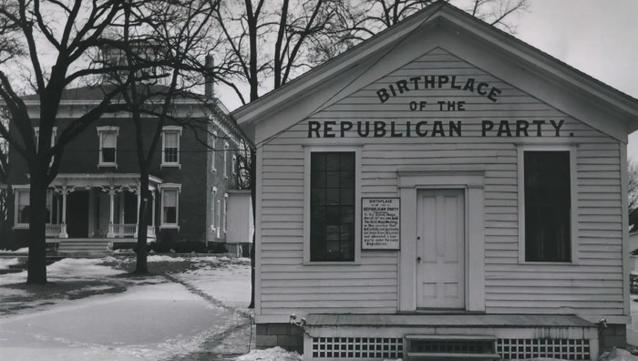Henry Clay (1777-1852) was an American lawyer and statesman, one of the defining political figures of his age. #History #WarOf1812 #MissouriCompromise #HenryClay #CompromiseOf1850 #AmericanSystem #AndrewJackson #GreatCompromiser #GreatTriumvirate #USHistory #HistoryFact https://whe.to/ci/1-24589-en/
#MissouriCompromise
The Compromise of 1850 was a series of five bills passed by the US Congress in September 1850 to diffuse a sectional crisis brewing between the 'free states' of the North and the 'slave states' of the South. #History #MissouriCompromise #CompromiseOf1850 #AmericanCivilWar #DanielWebster #HenryClay #JohnC.Calhoun #StephenA.Douglas #USHistory #ZacharyTaylor #HistoryFact https://whe.to/ci/1-24595-en/
The Missouri Compromise of 1820 was an effort by the US Congress to resolve a sectional dispute between the 'free states' of the North and the 'slave states' of the South. #History #ThomasJefferson #MissouriCompromise #AmericanCivilWar #HenryClay #Slavery #TallmadgeAmendment #USHistory #HistoryFact https://whe.to/ci/1-24005-en/
🚂 From steam engines to sectional tensions—America was growing fast, but not evenly.
Factories in the North, cotton in the South, and resistance in the West.
🎧 Dive into Episode #17!
https://url.thaliyal.com/upxSX1
#USHistory #Podcast #IndustrialRevolution #MissouriCompromise #history
“It is what you read when you don’t have to that determines who you will be when you can’t help it”*…
Indeed. And not just what one reads, but how one reads it. The estimable Henry Farrell reviews the “tech canon” that seems to underlie so much of what Silicon Valley and the tech world at large is advocating. That canon’s celebration of great men and the acomplishments of small teams helps explain everything from Mark Andreessen’s accelerationist manifesto through the machinations of DOGE to Jeff Bezos’ resteering of The Washington Post…
… Tech luminaries seem to opine endlessly about books and ideas, debating the merits and defects of different flavors of rationalism, of basic economic principles and of the strengths and weaknesses of democracy and corporate rule.
This fervor has yielded a recognizable “Silicon Valley canon.” And as Elon Musk and his shock troops descend on Washington with intentions of reengineering the government, it’s worth paying attention to the books the tech world reads — as well as the ones they don’t. Viewed through the canon, DOGE’s grand effort to cut government down to size is the latest manifestation of a longstanding Silicon Valley dream: to remake politics in its image.
Last August, Tanner Greer, a conservative writer with a large Silicon Valley readership, asked on X what the contents of the “vague tech canon” might be. He’d been provoked when the writer and technologist Jasmine Sun asked why James Scott’s Seeing Like a State, an anarchist denunciation of grand structures of government, had become a “Silicon Valley bookshelf fixture.” The promptled Patrick Collison, co-founder of Stripe and a leading thinker within Silicon Valley, to suggest a list of 43 sources, which he stressed were not those he thought “one ought to read” but those that “roughly cover[ed] the major ideas that are influential here.”
In a later response, Greer argued that the canon tied together a cohesive community, providing Silicon Valley leaders with a shared understanding of power and a definition of greatness. Greer, like Graham, spoke of the differences between cities. He described Washington, DC as an intellectually stultified warren of specialists without soul, arid technocrats who knew their own narrow area of policy but did not read outside of it. In contrast, Silicon Valley was a place of doers, who looked to books not for technical information, but for inspiration and advice. The Silicon Valley canon provided guideposts for how to change the world.
Said canon is not directly political. It includes websites, like LessWrong, the home of the rationalist movement, and Slate Star Codex/Astral Codex Ten, for members of the “grey tribe” who see themselves as neither conservative nor properly liberal. [Paul] Graham’s many essays are included, as are science fiction novels like Neal Stephenson’s The Diamond Age. Much of the canon is business advice on topics such as how to build a startup.
But such advice can have a political edge. Peter Thiel’s Zero to One, co-authored with his former student and failed Republican Senate candidate Blake Masters, not only tells startups that they need to aspire to monopoly power or be crushed, but describes Thiel’s early ambitions (along with other members of the so-called PayPal mafia) to create a global private currency that would crush the US dollar.
Then there are the Carlylian histories of “great men” (most of the subjects and authors were male) who sought to change the world. Older biographies described men like Robert Moses and Theodore Roosevelt, with grand flaws and grander ambitions, who broke with convention and overcame opposition to remake society.
Such stories, in Greer’s description, provided Silicon Valley’s leaders and aspiring leaders with “models of honor,” and examples of “the sort of deeds that brought glory or shame to the doer simply by being done.” The newer histories both explained Silicon Valley to itself, and tacitly wove its founders and small teams into this epic history of great deeds, suggesting that modern entrepreneurs like Elon Musk — whose biography was on the list — were the latest in a grand lineage that had remade America’s role in the world.
Putting Musk alongside Teddy Roosevelt didn’t simply reinforce Silicon Valley’s own mythologized self-image as the modern center of creative destruction. It implicitly welded it to politics, contrasting the politically creative energies of the technology industry, set on remaking the world for the better, to the Washington regulators who frustrated and thwarted entrepreneurial change. Mightn’t everything be better if visionary engineers had their way, replacing all the messy, squalid compromises of politics with radical innovation and purpose-engineered efficient systems?…
[Farrel discusses James Davidson and William Rees-Mogg’s The Sovereign Individual and the enhusiastic reactions of SV avatars Balaji Srinivasan and Curtis Yarvin…]
… We don’t know which parts of the canon Musk has read, or which ones influenced the young techies he’s hired into DOGE. But it’s not hard to imagine how his current gambit looks filtered through these ideas. From this vantage, DOGE’s grand effort to cut government down to size is the newest iteration of an epic narrative of change.
Musk, a heroic entrepreneur, will surely make history as his tiny team of engineers cuts the government Leviathan down to size. One DOGE recruiter framed the challenge as “a historic opportunity to build an efficient government, and to cut the federal budget by 1/3.” When a small team remakes government wholesale, the outcome will surely be simpler, cheaper and more effective. That, after all, fits with the story that Silicon Valley disruptors tell themselves.
From another perspective, hubris is about to get clobbered by nemesis. Jasmine Sun’s question about why so many people in tech read Seeing Like a State hints at the misunderstandings that trouble the Silicon Valley canon. Many tech elites read the book as a denunciation of government overreach. But Scott was an excoriating critic of the drive to efficiency that they themselves embody…
… Seeing Like a State, properly understood, is a warning not just to bureaucrats but to social engineers writ large. From Scott’s broader perspective, AI is not a solution, but a swift way to make the problem worse. It will replace the gross simplifications of bureaucracy with incomprehensible abstractions that have been filtered through the “hidden layers” of artificial neurons that allow it to work. DOGE’s artificial-intelligence-fueled vision of government is a vision from Franz Kafka, not Friedrich Hayek…
… Some of this revised canon might draw on Patrick Collison’s own bookshelves, which contain a far wider range of ideas than the canon itself. Collison’s reading interests tend toward classical liberalism, but writers who rub shoulders on his shelves, like Karl Popper and Elinor Ostrom, could be brought into debate with less well-known liberals like Ernest Gellner and contemporary left-liberals like Danielle Allen. All of these thinkers are deeply concerned with building and maintaining a genuinely plural society in which groups can get along despite their differences…
We are what we read: “Silicon Valley’s Reading List Reveals Its Political Ambitions” (gift article) from @himself.bsky.social in @bloomberglp.bsky.social. Eminently worth reading in full…
… as is Farrell’s addendum (in his wonderful newsletter): “Silicon Valley’s thing about Great Men“– “There is an alternative.”
And listen to Farrell discuss these issues (with Max Read and John Ganz) in the podcast episode “The Silicon Valley canon and malformed publics“
And for a reminder that this phenomenon has long, deep roots, see “Geeks for Monarchy: The Rise of the Neoreactionaries,” from TechCrunch in 2013.
* Oscar Wilde
###
As we anguish over antecedents, we might recall that it was on this date in 1854 that the Republican Party was “organized” (In Ripon, Wisconsin). It held its first public meeting on March 20th and its first convention on July 6 of that same year.
The party grew out of opposition to the Kansas–Nebraska Act, which repealed the Missouri Compromise and opened the Kansas and Nebraska Territories to slavery and future admission as slave states, and was largely animated by anti-slavery advocates (including some ex-Whigs, and ex-Free Soilers).
The Kansas–Nebraska Act was authored by Democratic Senator Stephen A. Douglas and passed in 1854… the same Stephen Douglas that debated Abraham Lincoln in the 1858 Illinois Senate race. Douglas was re-elected by the Illinois General Assembly, 54–46. (Until 1913, when the 17th Amendment to the United States Constitution— which provides that senators shall be elected by the people of their states– was ratified, senators were elected by their respective state legislatures.) But the publicity made Lincoln a national figure and laid the groundwork for his 1860 presidential campaign.
How times change…
Ripon, WI (source)#abolition #AbrahamLincoln #books #canon #culture #history #KansasNebraskaAct #MissouriCompromise #philosophy #politics #reading #Republican #RepublicanParty #SiliconValley #slavery #society #StephenDouglas #Technology
James Monroe (1758-1831) was an American statesman who served as the fifth president of the United States (1817-1825). #History #LouisianaPurchase #JamesMonroe #AmericanRevolution #MissouriCompromise #MonroeDoctrine #USFoundingFathers #USHistory #HistoryFact https://whe.to/ci/1-23597-en/
“I was not a great student in college. I liked learning, but not on someone else’s timetable. It was this story that woke me up and made me a scholar. I found it fascinating that a group of ordinary people from country towns who shared a fear that they were losing their democracy could figure out how to work together to reclaim it.”
#HeatherCoxRichardson #History #Maine #MissouriCompromise #histodons
https://open.substack.com/pub/heathercoxrichardson/p/march-15-2024?r=1k4nht&utm_medium=ios
THIS DATE IN HISTORY
So, I clicked on a This Date in History link and found that this date marks the point in 1820 that the Missouri Compromise was reached, the date in 1913 when the US art world was rocked by the opening of the Armory Show, and the date in 1966 when "Good Vibrations" was recorded by The Beach Boys. That puts the BBoys in pretty amazing company. I once saw a "Good Vibrations" verse written by Audree Wilson, the Wilson brothers mother; and it would be terrific to see it again.
Being a Maine native, I give something of a nod to the Missouri Compromise, which converted the Massachusetts District of Maine into the State of Maine.
Anyway, let's pick up good vibrations all day long.
:
#armoryshow #audreewilson #beachboys #brianwilson #goodvibrations #maine #massachusetts #missouricompromise #musicnews #stateofmaine #thearmoryshow #thebeachboys
:::
"[T]his “Missouri Compromise” infuriated northerners, especially those who lived in Maine. They swamped Congress with petitions against admitting Missouri as a slave state, resenting that enslavers in the Senate could hold the state of Maine hostage until they got their way."
#TIL #Texas #CriticalRaceTheory #MissouriCompromise
I just learned this is the reason why Texas has a panhandle.

